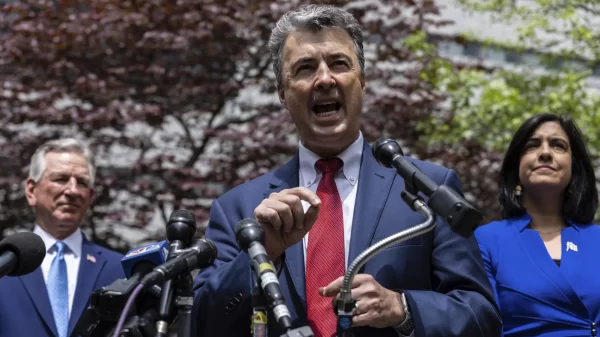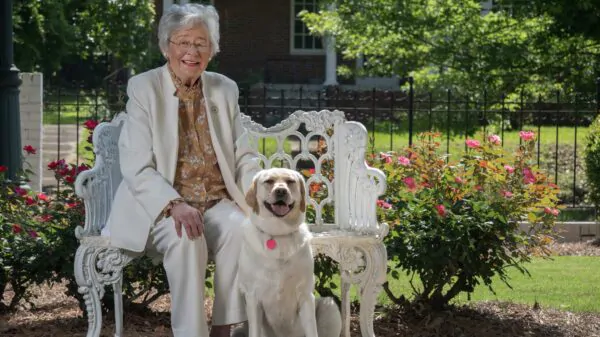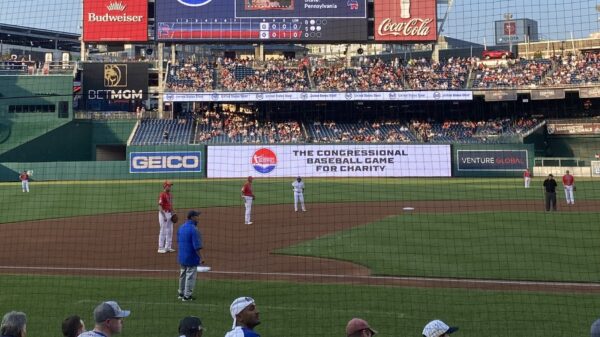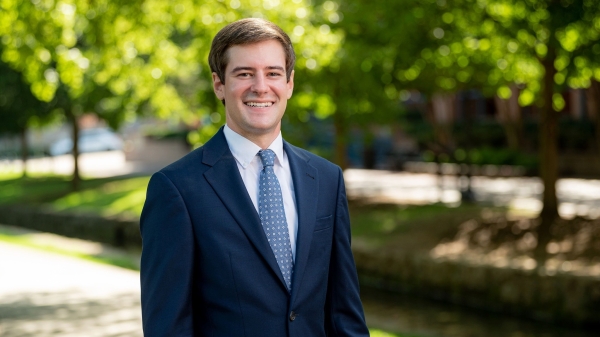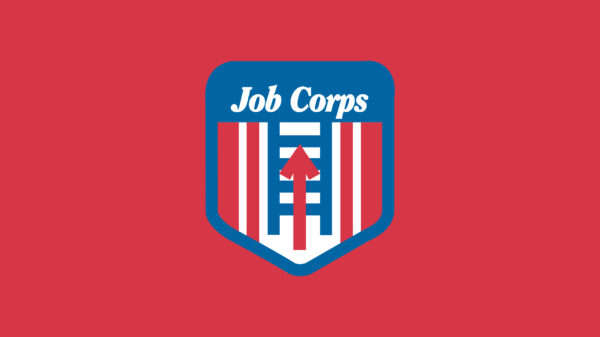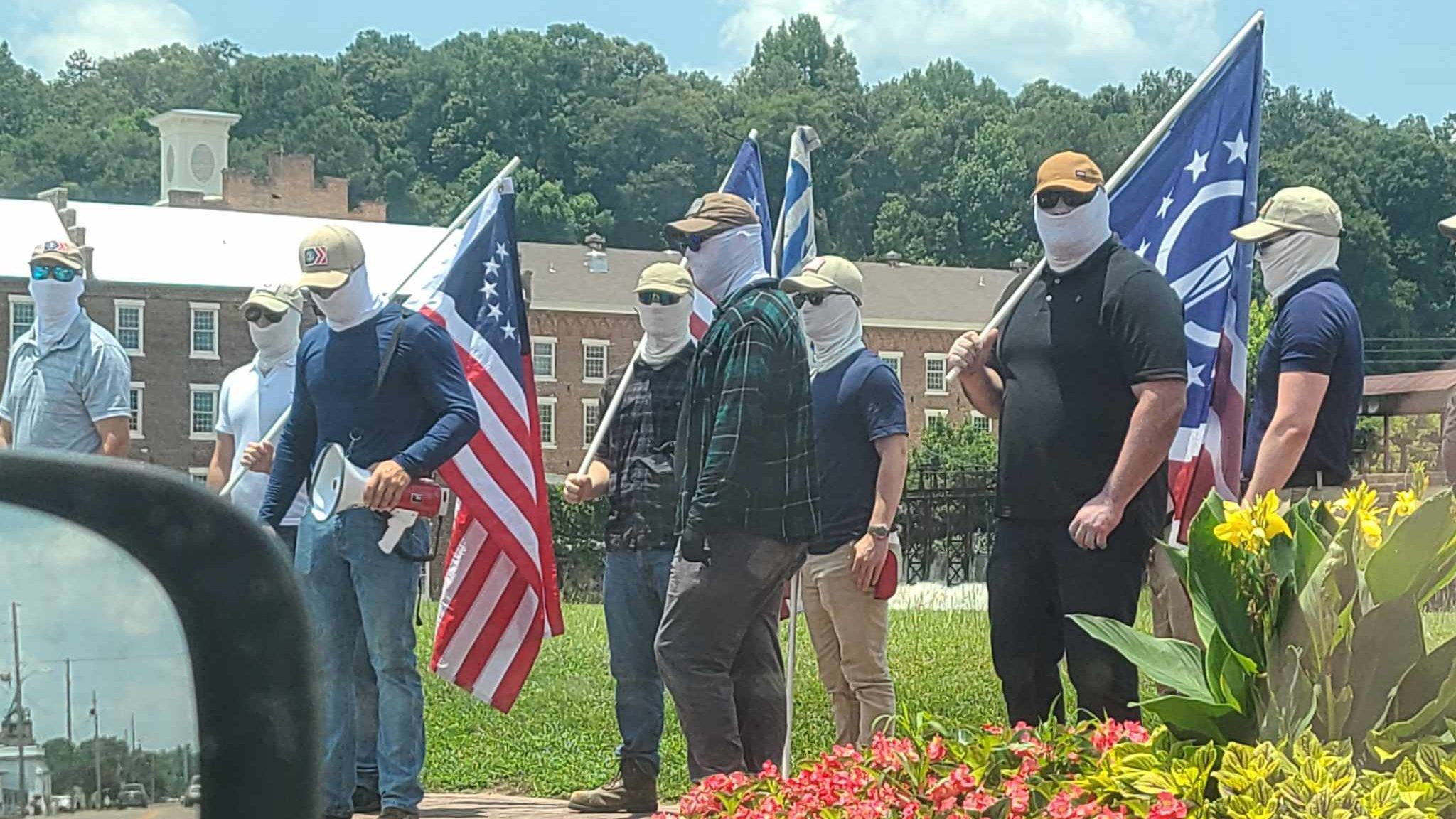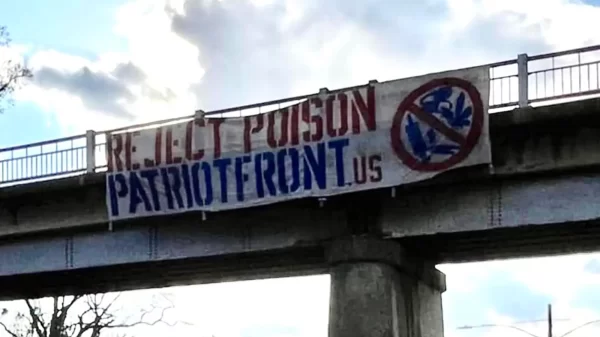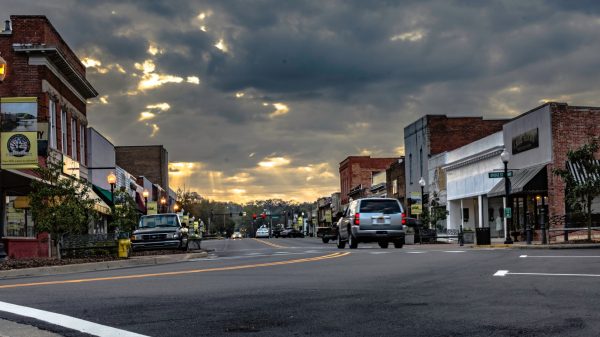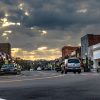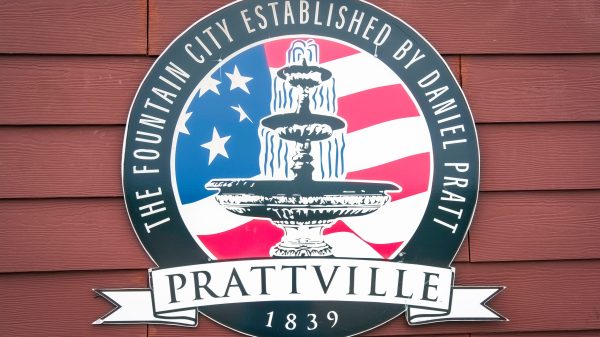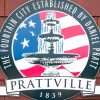When 13 members of the white supremacist group Patriot Front appeared at an LGBTQ pride picnic in Downtown Prattville last week, it wasn’t immediately clear that they had broken any laws.
Picnic-goers praised Prattville police for quickly engaging the men—who seemingly all came from out of town—and quelling the situation.
Most of the men involved simply stood silently, holding a banner that read “RESTORE AMERICAN VIRTUE,” while the group’s regional leader over Alabama, Wesley Van Horn, proclaimed that the LGBTQ attendees were involved in “deplorable acts” that are “poisoning the minds of the innocent and the children.”
Regardless of opinions on that speech, it is almost surely protected under the first amendment.
But based on the plain language of the Code of Alabama, it appears the men had committed a violation of a section in Alabama’s loitering law which appears to be tied back to a 1949 law in response to the activities of the Ku Klux Klan.
What does the law say?
The applicable portion of the law can be found in Section 13A-11-9 of the Code of Alabama: “(a) A person commits the crime of loitering if he or she does any of the following: … (4) Being masked, loiters, remains, or congregates in a public place.”
Exceptions are made for masquerade parties, public parades, presentations of historical, educational of religious characters and for sporting events, none of which would apply to the Patriot Front members.
A violation of the state’s loitering law comes with a fine of up to $200 and up to 30 days in a county jail.
A new section of the law will come into effect in August, making second and all subsequent violations of the loitering law in the same jurisdiction a Class C misdemeanor punishable by up to $500 and up to three months in a county jail.
The rest of that bill focused on targeting loitering on public roadways, but the section that scales violations up to misdemeanors applies to all violations of the loitering law.
How is the law enforced?
There’s not much information readily available on the usage of the law over the past 70 years, although there are a few examples. But the American Civil Liberties Union of Alabama raised concerns about the law in 2020 as everyday Alabamians became required to wear masks in public near-constantly, prompting Attorney General Steve Marshall to share his opinion on the law.
“As numerous Attorney General’s Opinions have noted, ‘words used in a statute must be given their natural, plain, ordinary and commonly understood meaning,’” the attorney general’s office said in a statement to AL.com at the time. “In this context, the commonly understood use of the term ‘being masked’ read in context with the rest of this law, would not include wearing medical masks that covers the nose and mouth. Just as statutory interpretation requires common sense, so does the enforcement of said statues.”
Patriot Front use gaiter-style masks that many people used during Covid-19, which cover the neck and the entire bottom of the face including the nose, mouth and ears. Unlike a surgical mask, these masks also conceal the sides and back of the lower part of the head. Patriot Front members also wear dark sunglasses to conceal their eyes and top the ensemble with a baseball cap, effectively concealing their entire face from view.
Unlike the clear-cut mask of the KKK, it is unclear how a judge might rule on whether the Patriot Front combination constitutes “being masked.”
The Attorney General’s office did not respond to repeated requests for comment for this story.
Carlos Chaverst of Birmingham is one of the few known individuals to be charged under the statute. Chaverst, a Black man, was wearing a mask during a protest outside of the Hoover in Walmart in December 2018 following the fatal police shooting of a Black man at the Galleria on Thanksgiving.
Chaverst was wearing a mask, which he argued was due to the below-freezing temperatures. Hoover police charged him both with disorderly conduct and loitering under the statute.
According to a report from WBHM, Hoover City Administrator Allan Rice says police warned Chaverst to uncover his face but he refused.
The article also cites University of St. Thomas law professor Robert Kahn, who told WBHM that use of the law “is probably unconstitutional.”
Kahn has spent years studying anti-masking laws and said other states have tightened up their laws with language requiring “intent to intimidate” to use the law. But Alabama’s law has remained broad.
Chaverst fought the charge, but it appears ultimately entered a plea agreement in his case.
The law was also used against anti-fascist protestors at an Auburn University speech by white nationalist Richard Spencer. Fearing that Spencer’s inflammatory rhetoric could spark violence, Auburn University tried to cancel Spencer’s speech, but U.S. District Judge W. Keith Watkins ruled that the university must allow Spencer to speak.
“While Mr. Spencer’s beliefs and message are controversial, Auburn presented no evidence that Mr. Spencer advocates violence,” Watkins stated in his ruling, noting that threats of violence by opposition are not sufficient to limit Spencer’s freedom of speech.
However, Watkins did note in the ruling that police could prohibit attendees from being masked, specifically citing compliance with the loitering code. Nobody at the event was charged under the statute, but protestors were prohibited from wearing masks.
Code may be derived from 1949 law reacting to activity of the Ku Klux Klan
According to Kahn, anti-masking laws began to sweep the South in the early 1900s particularly as the South planned to make a case for segregation, wanting to shed the violent imagery of the Klan to present a way forward for segregation in a modern world.
“In my reading, I got a sense that before desegregation there was an attempt to present segregation as acceptable with a modern society; part of what that meant was fighting for ‘separate but equal.’ And that meant really they were really going to try to make the schools equal. There was a concern that whites would be upset about rebuilding Black schools. There was a concern the KKK would protest and be a symbol of everything the South no longer was.”
But in Alabama, Kahn said, there may have been some legitimate rise in anti-Klan sentiment to go along with the political maneuvering.
Multiple Alabama historical records reference an event at Camp Fletcher as a major impetus for the 1949 law.
Camp Fletcher was added to the Alabama Register of Landmarks and Heritage in May 2018. In the announcement of the camp’s addition to the registry, the Alabama Historical Commission referenced the event.
“On June 10, 1948 the camp was raided by members of the Ku Klux Klan during a training session for Girl Scout leaders,” the statement reads. “The attackers searched the women’s pocketbooks and wrote down their names and addresses. The incident, along with similar raid two days earlier at Camp Blossom Hill in Birmingham’s Brummitt Heights neighborhood, prompted Birmingham attorney Abe Berkowitz to form a coalition of business and civic groups to demand better enforcement against Klan terrorism. In 1949 Governor Jim Folsom signed an ‘Anti-Masking Bill’ aimed at reducing Klan activity.”
Historical documents indicate that the law made public masking a misdemeanor, and the law could very well remain in Alabama’s lengthy and obfuscated constitution, but no such misdemeanor appears in the more concise Code of Alabama.
Kahn said the intent of the law could make a difference if a member of Patriot Front were charged under the statute, even if the law is overbroad.
“I could see the court saying (like the Georgia Supreme Court said in ) State v. Miller— sure, the law is too broad, but what you did is close enough to the core concerns of the law that we’re going to write an intent to intimidate proviso. That’s just as likely as them throwing out the law because it’s too broad.”
How courts have ruled on the constitutionality of anti-mask laws
Kahn referenced State of Georgia v. Miller, an example of an anti-masking law that has thus far held up in court challenges.
The Georgia Supreme Court in that case found that a mask is “a particularly effective means of committing crimes of violence and intimidation.”
“From the beginning of time the mask has been the criminal’s dress,” the court ruled. “It conceals evidence, hinders apprehension and calms the criminal’s inward cowardly fear … A nameless, faceless figure strikes terror in the human heart. But, remove the mask, and the nightmarish form is reduced to its true dimensions. The face betrays not only identity, but also human frailty.”
The case was brought by a man who had stood on a public street in full Klan regalia, passing out leaflets. The Supreme Court ruled that the state’s law against masking did not substantially infringe on his right to free speech, particularly weighed against the public interest.
It also rejected the man’s argument that the law was over broad, where it added that the law could be narrowed to masking with an intent to intimidate.
“We construe the statute in conjunction with its policy statement to apply only to the mask-wearing conduct when the mask-wearer knows or reasonably should know that the conduct provokes a reasonable apprehension of intimidation, threats or violence,” the court ruled.
However, other states have agreed with challenges to similar laws.
A U.S. District Judge struck down such an ordinance in Goshen, Indiana, siding with the Ku Klux Klan that the law violated the Constitution by infringing upon the klan’s right of assembly.
No anti-masking law has ever reached the U.S. Supreme Court.



